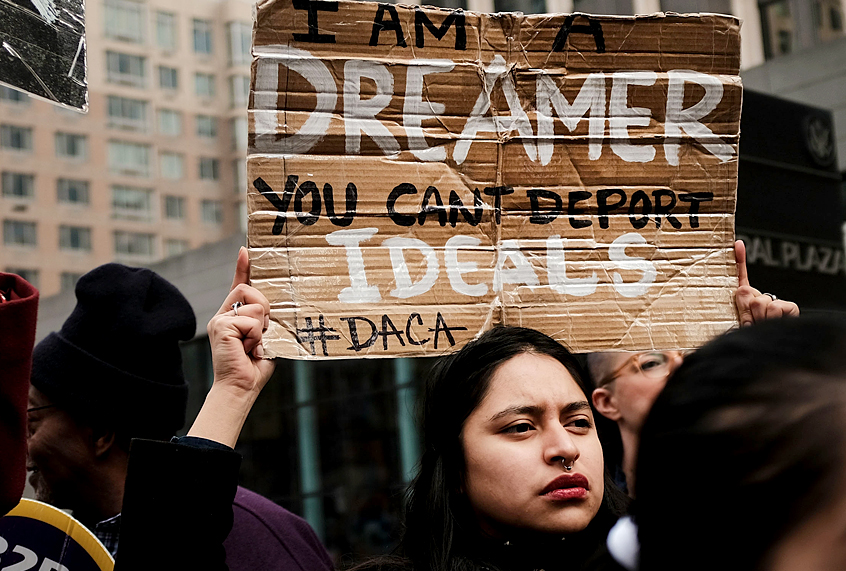Last month, Minnesota Governor Tim Walz signed a bill into law to allow undocumented immigrants to obtain state-issued drivers’ licenses. When the legislation goes into effect on October 1st, Minnesota will be the 19th state to enact this policy, along with Washington D.C. and Puerto Rico. With a driver’s license, age-eligible immigrants in Minnesota — no matter their immigration status — will have the freedom to drive their children to school, pick up groceries, commute to work and visit a doctor’s office without the fear of losing their car, getting detained or paying heavy fines. Like all drivers in Minnesota, recipients will be required to obtain insurance and pass a written test and a road test.
Advocates and elected officials in other states, including Idaho, Wisconsin and Texas, have indicated interest in organizing around similar legislation to provide state-issued licenses. Regardless of the political calculus, they remain energized, creative and steadfast in pursuing potential opportunities for immigrants to thrive at the state and local level. For many, including the advocates in Minnesota who waited more than twenty years for the passage of legislation like the “Driver’s Licenses for All” bill, securing basic freedoms for all community members is worth the fight.
The freedom to thrive in America — something we all aspire to — is about more than federal legal status. It’s also about each of us having access to health care and paid sick leave. It’s about access to quality education. It’s a roof over your head and food on the table. It’s feeling safe and secure at work, in our communities, and at home.
So, while federal immigration legislation may seem unlikely in the short term, significant victories at the state and local levels continue to be won. As our recent report looking back at the past ten years illustrates, there is energy, momentum and support in the states that can be leveraged and turned into meaningful change.
In November’s midterms, voters not only flipped Arizona blue, but also passed Proposition 308, which will provide in-state tuition to students regardless of immigration status. This in a state that in 2010 passed the notoriously discriminatory, anti-immigrant S.B. 1070, and which was home to anti-immigrant Sheriff Joe Arpaio, who was convicted of criminal contempt for his targeting of immigrants. Local activists and immigrants’ rights groups who spent years organizing and turning out the vote led to these victories and provide hope for us all.
In Massachusetts, voters also turned out in support of providing driver’s licenses to immigrants regardless of status.
Each of these victories was won in the wake of a moment a lot like this one — when Congress was divided and prospects for progress in Washington had dimmed.
This hope didn’t only come from places you might expect. Advocates have made real progress for immigrant communities in many deep red pockets of America too. In Tennessee, advocates successfully fought to stop the county sheriff in Nashville from renting jail beds to Immigration and Customs Enforcement. Students in Utah who have long been waiting for a path to citizenship can now apply for the state’s college scholarship programs. So can their counterparts in Kansas, Nebraska, Oklahoma, and Texas. DACA recipients and other work-authorized immigrants can obtain any professional or occupational license in Arkansas, one of 17 states to do so.
Elsewhere, bold new policies are pushing the envelope on what’s possible for immigrant justice. In eight states and the District of Columbia, immigrant taxpayers can now receive a state-based version of the Earned Income Tax Credit. And three-quarters of America’s foreign-born population lives in a state that has extended access to health coverage to at least some children, pregnant people, and older adults—regardless of immigration status.
These state and local achievements don’t always make the national headlines. But they are proof of the growing, collective strength of the immigrants who call America home. And they matter.
They matter to the father in Minnesota who will soon be able to drive to work without fear of being racially profiled and torn from his family over a traffic violation. They matter to the grandmother in Illinois who can now go to the doctor when she gets sick. They matter to young people in Colorado and Florida, ready to start their careers and give back to the communities they love.
To be clear: A path to citizenship remains essential to the freedom to thrive, and we’re never going to stop fighting for it. But the folks who achieved all these victories have proven time and again that progress is possible when we work for change in our own backyards.
So, even as Congress once again drops the ball, immigrants and organizers stand ready to pick it back up, as we always have, and always will.

